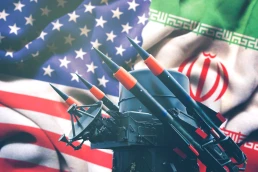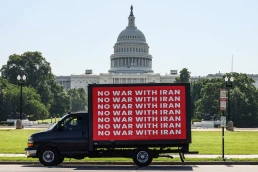“Are there still negotiation possibilities?” asked Noam Chomsky. “There’s only one way to find out. That’s to try. If you refuse to try, of course, there’s no option, no possibilities.”
By Brett Wilkins, Common Dreams
Proponents of a negotiated diplomatic solution to end Russia’s invasion of Ukraine this week decried the Biden administration’s latest military assistance package for the embattled country, warning that the longer the fight continues, the greater the chance of a catastrophic nuclear war.

The Pentagon announced Tuesday that the U.S. will deliver up to $625 million worth of additional armaments and ammunition to Ukraine following Russia’s illegal annexation of four Ukrainian regions last week, a move that prompted Ukrainian President Volodymyr Zelenskyy to formally apply for NATO membership.
The new package includes four High Mobility Artillery Rocket Systems (HIMARS) and an unknown number of guided missiles; 16 155mm howitzers and 75,000 precision-guided artillery rounds; 1,000 155mm remote anti-armor mines; 16 105mm howitzers; 30,000 120mm mortar rounds; 200 MaxxPro mine-resistant ambush-protected vehicles; 200,000 rounds of small arms ammunition; and other armaments.
BREAKING: Biden administration confirms new $625M package of weapons for Ukraine. Includes:
-4 HIMARS launchers and ammo
-16 155mm Howitzers;
-75,000 155mm artillery rounds;
-500 precision-guided 155mm artillery rounds;
-1,000 155mm rounds of Remote Anti-Armor Mine (RAAM) Systems— Lara Seligman (@laraseligman) October 4, 2022
U.S. Secretary of State Antony Blinken said the new aid—which comes on top of more than $15 billion in American military assistance to Ukraine since Russia invaded on February 24—is “carefully calibrated to make the most difference on the battlefield and strengthen Ukraine’s hand at the negotiating table when the time is right.”
Peace advocates stressed that—with Russian President Vladimir Putin’s repeated threats to use nuclear weapons—the right time is right now, and that the United States and NATO allies should stop trying to weaken Russia by prolonging the war.
“The longer the war goes on, the longer it’s maintained, the more the prospects for a diplomatic settlement diminish,” U.S. political dissident and professor Noam Chomsky told Democracy Now! host Amy Goodman in a Monday interview. “The longer the war continues, the more the window closes.”
However, Chomsky noted that the United States and Britain “are keeping to the principle that the war must continue to severely weaken Russia—meaning no negotiated settlements, with all the consequences that follow.”
Noam Chomsky says the U.S. and Britain are "pretty much isolated in their commitment to continuing the war" in Ukraine, with much of the rest of the world favoring a negotiated settlement to the conflict. pic.twitter.com/yCGtbDKWEw
— Democracy Now! (@democracynow) October 3, 2022
Harry J. Kazianis, senior editor at 19FortyFive and president of the Rogue States Project, a bipartisan national security think tank based in Washington, D.C., wrote Monday for the Quincy Institute for Responsible Statecraft that “tensions are rising by the second,” while “the chances of a nuclear war increase significantly every day that passes.”
“Considering the stakes—among them, the possibility that Russia will feel so boxed in that it will turn to its arsenal of 6,400 nuclear warheads and try to end the Ukraine war on its own terms despite the risk of a nuclear holocaust—one would think talks would already be happening as we speak,” Kazianis continued.
“Sadly,” he added, “due to the Western narrative that Ukraine is ‘winning’ the war against Moscow, the Biden administration appears to believe it can put enough pressure on Putin with more weapons for Ukraine that he will give up his newly annexed territories and go home with his atomic tail between his legs.”
According to recent polling by the Quincy Institute and Data for Progress, 49% of Americans want Biden to do more to seek a diplomatic solution to the war.
Poll shows the American people want Biden to do more diplomatically to end the war in Ukraine. Sending weapons without a diplomatic strategy isn't enough. pic.twitter.com/6yaVlRhX9h
— Trita Parsi (@tparsi) September 27, 2022
“This is not just the United States,” Jacobin staff writer Branko Marcetic told “Breaking Points” podcast hosts Krystal Ball and Saagar Enjeti on Tuesday. “There was a poll in Germany that shows most Germans, who are really feeling harshly the economic blowback of the sanctions, they want more diplomacy to try to end the war.”
“This is also the prevailing opinion in most of the rest of the world, the Global South,” he added. “You can look at… countries like Turkey, or say Mexico, who have attempted to try and broker some sort of peace agreement.”
Thank you to @krystalball and @esaagar for having me on to talk about the almost total absence of calls for dialogue and restraint, or even a peace movement, in the face of what are alarmingly escalating nuclear tensions that could destroy the world.https://t.co/ivhCYL8317
— Branko Marcetic (@BMarchetich) October 4, 2022
China has been a leading proponent of de-escalation and finding a diplomatic solution to the war. Speaking last week, Zhang Jun, China’s permanent representative to the United Nations, said that his country’s government “calls on all parties concerned to exercise restraint, refrain from actions that exacerbate tensions, and leave space for settlement through diplomatic negotiations.”
“The pressing priority is to make every effort to de-escalate the situation,” he added, “and guide the parties to restart diplomatic negotiations as soon as possible to open the door to a political settlement with legitimate concerns brought into the negotiations and viable options put on the table, in an effort to achieve an early ceasefire.”
With Zelenskyy having signed a decree Tuesday asserting that the prospect of talks with Putin is “impossible”—while signalling an openness to future negotiations with a change in Russian leadership—many Western observers have argued that seeking a diplomatic solution is an exercise in futility at this point.
“Are there still negotiation possibilities? There’s only one way to find out. That’s to try,” said Chomsky. “If you refuse to try, of course, there’s no option, no possibilities.”
Marcetic asked: “Where is the peace movement? There used to be a robust peace movement throughout the Cold War.”
“All that seems to be gone,” he added. “I wish that people were more active and more outspoken about this to demonstrate that, no, you know, nuclear war is not worth anything.”
Recent Posts
Oman’s Foreign Minister Said US-Iran Deal Was ‘Within Our Reach.’ Then Trump Started Bombing
February 28, 2026
Take Action Now “The Omani FM decided to go public,” suggested one observer, “so that the American people knew that peace was within reach when Trump…
A War With Iran Would Not Be a One-Off Event But a Disastrous Ongoing Rupture
February 26, 2026
Take Action Now If Congress cedes its power to stop a war with Iran, it will fully erode any lingering promise of democratic restraint.By Hanieh…
New Addition to List of Nuclear Near Catastrophes
February 25, 2026
Take Action Now Debris flew for great distances — many times the distance of 270 meters to a nuclear reactor and nuclear storage facility.By David…
Gavin Newsom’s last budget belies his ‘California for All’ pledge
February 24, 2026
Take Action Now Yet, even as the state is poised to lose billions in federal funding, and millions of Californians are losing access to health care…




